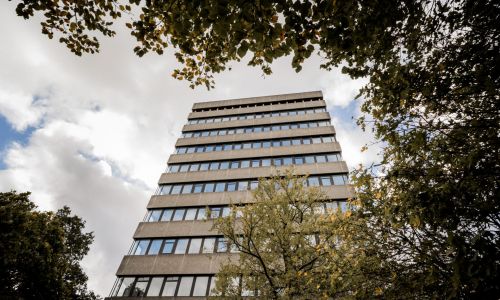Board on return Paul Bakker: ‘This decision should create peace at faculty’
-
 Foto: Diede van der Vleuten
Foto: Diede van der Vleuten
For the past three years, Paul Bakker’s future at Radboud University was uncertain. Until today. The university announced that Bakker will stay on as a professor but will no longer occupy a teaching position. Vice-chair Agnes Muskens and dean Heleen Murre-van den Berg expand on the decision.
Three years ago, Professor Paul Bakker of History of Philosophy came into infamy after the Executive Board received multiple reports regarding him. The resulting investigation brought ‘transgressive behaviour’ to light.
After that, things were quiet around Bakker. But today the university announced that the professor will remain employed part-time at the Faculty of Philosophy, Theology and Religious Studies. However, his work will solely focus on doing research, which does involve guiding PhD candidates; Bakker will not be returning to the lecture halls.
At least for now. ‘He was not permanently banned from teaching’, according to Agnes Muskens, vice-chair of the Executive Board. ‘There may come a time when we will say he’s allowed to lecture again.’
However, this won’t come to pass anytime soon. Rather than teaching, Bakker will spend the other half of his contract with Radboud University Press as an academic staff member; he is set to begin on September 1st.
In the beginning, Bakker’s focus will be on his new job, according to dean Heleen Murre-van den Berg: ‘In our discussions with him, we have agreed that he doesn’t need to be on campus very often.’
Muskens: ‘But he is not forbidden from coming to the faculty more often. He no longer has to ask for permission.’ This was the case for the past few years.
Isn’t it quite remarkable to have a professor who doesn’t teach?
Muskens: ‘It is a considered choice that was made through solid discussions with all those involved.’
Murre-van den Berg: ‘I grant that it is indeed quite exceptional. But I myself also refrained from teaching for several years, because my position as dean meant I could not spare the time. There are also several other staff members who teach but don’t do research; they’re just not professors.’
Why is Bakker no longer allowed to teach?
Murre-van den Berg: ‘There were a lot of concerns at the faculty, especially among students; those played a major part. It was a matter of weighing Paul’s interests against the students’ concerns. The decision we made should create some peace at the faculty, allowing us to work on the improvement process. We don’t want to yearly revisit the discussion about whether Paul should be allowed to teach.’
‘There are plenty of people at the faculty who know what happened’
In what way has this decision addressed the concerns of students?
Murre-van den Berg: ‘The assessors and students of the Faculty Student Council (FSR) have been closely involved with the process over the past three years. The matter of Paul’s return was also repeatedly addressed during talks with students about social security.’
The external report by the Berenschot bureau brought Bakker’s ‘transgressive behaviour’ to light in 2020. However, that report was never released to the public. Does that mean that the students in the FSR were informed enough to properly participate in the discussion about Bakker’s future at the university?
Murre-van den Berg: ‘Yes, the students were well-informed enough to come to a decision. There are plenty of people at the faculty who know what happened. Additionally, sometimes the members of the FSR are apprised of confidential information in the closed parts of the meetings.’
‘Announcing what exactly took place would not help make matters clearer. The facts themselves are up for debate, which would serve to lengthen the debate. Some people would wonder what we were so worried about, while others would think that Paul’s behaviour deserved a much harsher sentence.’
Muskens: ‘We consciously made the decision to mention that Paul received an official reprimand for transgressive behaviour. We want to be as open as possible, but that openness should serve all those involved. We have assured them that we would not release what has happened.’
Murre-van den Berg: ‘Our aim is to protect the whistle-blowers. People already have a steep hill to climb to report inappropriate behaviour; it’s something they dread.’
Were the whistle-blowers informed of the decision?
Murre-van den Berg: ‘Yes, they were indeed informed of the decision.’
Are they pleased with the resolution?
Murre-van den Berg, somewhat hesitant: ‘I don’t think I should speak for them.’
Paul Bakker will remain a university employee. Does that mean you are confident that he will not repeat his transgressive behaviour?
Muskens: ‘If we weren’t confident, we would have taken different steps. We have faith that the incidents will not be repeated.’
Why was the decision made to mention Paul Bakker by name immediately at the announcement of the investigation in 2020?
Muskens: ‘Because he had already been nominated for the position of dean.’
‘Whether Paul’s behaviour was appropriate for a teacher-researcher was never up for debate’
Murre-van den Berg: ‘We could have released a statement saying that he withdrew for personal reasons, but that would have truly landed us in a minefield.’
Don’t you think that a degree of transparency concerning the nature of Paul’s transgressive behaviour would have meant that the process could have been resolved much more quickly?
Murre-van den Berg: ‘I don’t think that would have made things easier for Paul. Whether his behaviour was appropriate for a teacher-researcher was never up for debate.’
Are there things you feel you should have done differently?
Muskens: ‘Paul would have been aided by a quicker resolution.’
Then why didn’t that happen? There was a similar case at Artificial Intelligence, with a much faster response; the employee in question will be leaving the university.
Muskens: ‘There may have been parts where speed was an issue, but hindsight is always 20/20. Careful action takes time, to quote Mariëtte Hamer (government commissioner for combating inappropriate behaviour and sexual violence, ed.). I do think we could have communicated differently. It’s something I struggle with.’
Murre-van den Berg: ‘Every step in the process took time. If we were presented with the same case now, we might be able to act quicker.’
But why did it take three years?
Murre-van den Berg: ‘There is no need for secrecy. At a certain point, we as the Faculty Board wanted to let him return to teaching. The debate that sprang from that intention made us change our minds.’
Muskens: ‘We very carefully considered what this would mean: for the university, for the faculty, for Paul, for employees, and for students. That requires a lot of deliberation, which can take weeks.’
Were there times when the university fell short of its duty owed to Paul Bakker? For instance, the time when journalist Tim Hofman called on people to report to him about Bakker, in the middle of a full Pieter Bondam square at Radboud Rocks.
Muskens. ‘I myself wonder how that happened. At the time there was very little we could do; I felt very bad for Paul. We do try to live up to that duty, but I don’t know if that is true in his experience. I imagine he must have felt awful at times.
The AI employee was let go after a joint discussion. Was there a similar point of discussion with Bakker?
Muskens: ‘We are not at liberty to discuss.’
When you (Muskens) took office, you claimed to be a proponent of a zero tolerance policy when it came to transgressive behaviour.
Muskens: ‘That’s right. But zero tolerance also means that issues should be thoroughly investigated, and that the results of it should be shared. Those results are the basis for further discussion. If someone committed a crime, that makes the discussion very simple. But in grey areas, you owe it to all involved to find the best solution.’
Do you think that Bakker’s case would be handled differently now that there is a code of conduct?
Muskens: ‘We would still investigate in the same way, and we would take appropriate measures based on the results.’
Murre-van den Berg: ‘The code is a tool, but it’s too simple to state that it would have led to a dismissal.’
Mariëtte Hamer provided a whole list of recommendations for organisations dealing with transgressive behaviour. Has Radboud University learned anything from those recommendations?
Muskens: ‘Let me first state that we are very much a learning organisation. Hamer states that acting cautiously is important. Do not panic, but perform a careful investigation, and consider the best interests of all involved. We have done a lot the past year: we’ve established a code of conduct; we’ve empowered our confidential advisors; we have appointed an ombudsperson for staff members and will soon appoint one for students; and we’ve hired a policy officer for social security. We aim to re-evaluate our code of conduct at the end of the year. But it starts with addressing each other when it comes to certain behaviour. In that respect, our organisation has room to grow.’
‘Without external investigations, it is impossible to get to the bottom of things’
Murre-van den Berg: ‘If you come to a point where you need a code of conduct or similar documents, you are essentially already too late. People who make blunt comments or off-colour jokes should be called on it. Those are not fireable offences, but they do call for addressing the issue. That is where the code of conduct comes in.’
Hamer did caution against resorting to external investigations too quickly. According to her, organisations can prevent a lot of anguish by talking to the reporters and those accused. But external bureaus were used in both Paul Bakker’s case as well as that of AI.
Muskens: ‘When we need an external investigation, that means we’re already escalating. That means there are reports requesting such an investigation.’
Murre-van den Berg: ‘Without external investigations, it is impossible to get to the bottom of things. There will always be cases where a faculty or a university can’t get it done properly. Of course, we try to solve everything internally, but that’s not always an option.’
Muskens: ‘I do enjoy the professional nature that comes with external bureaus. They have their own independent procedures and standards.’
There has been a lot of polarisation within the Faculty of Philosophy, Theology and Religious Studies. This is reflected in the ombudsperson’s report, set to be published soon. How do you intend to deal with that?
Murre-van den Berg: ‘It’s difficult to get the two opposite sides to talk to each other, but there is also a large group in the middle. I do worry about the level of polarisation, but things aren’t all bad. For example, we did have good, fruitful discussions concerning diversifying education.’
Is there still willingness within the faculty to talk about social safety? We have heard more than once that the constant emphasis on social safety can have adverse effects.
Muskens: ‘Social security was not as prominent a topic as it is now; this is true for all of society. Some people think that’s hard to talk about, but we can’t afford to disregard the topic.’
Murre-van den Berg: ‘People have different tolerance levels when it comes to these discussions. I think it’s important that those in charge learn to handle that.’
Does the university now have a procedure in place in the case of new transgressive behaviour or other inappropriate acts?
Muskens: ‘We had such procedures at the onset of this case as well, we just lacked the experience. We are aware that all those involved appreciate swift action, but it requires discussing and listening, and carefully weighing the results of any investigations. I feel we have professionalised in that area.



